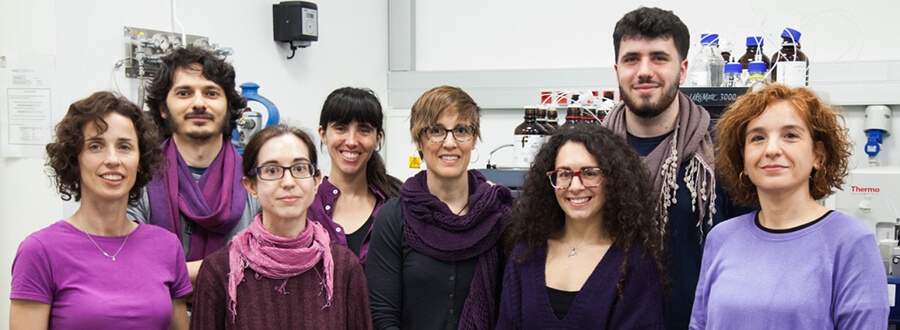
IRB Barcelona leads a biomedical proteomics unit to boost personalised medicine
The Institute of Research in Biomedicine (IRB Barcelona), based in the Barcelona Science Park, has received funding from the European Regional Development Fund (ERDF) to acquire cutting-edge technology in the field of proteomics, together with the Josep Carreras Leukemia Research Institute, the Sant Joan de Déu Research Institute, Vall d’Hebron Institute of Oncology and the University of Barcelona.
Proteomics is the large-scale study of the proteome, that is to say, all the proteins of an organism. It is used to identify, quantify, and study the structure of proteins and their cellular interaction networks. In both health and disease, proteins are the molecules responsible for carrying out the activities dictated by genes, and the potential alterations that the later may carry. Proteins are therefore ultimately responsible for the proper function or malfunction of cellular processes and are a key study tool and an obvious therapeutic target.
IRB Barcelona’s Mass Spectrometry and Proteomics Core Facility, led by Marta Vilaseca and formed by a research team with extensive expertise in the field, has received funding from the Government of Catalonia, through the European Regional Development Fund (ERDF), to purchase next-generation instrumentation for protein analysis, jointly with the Josep Carreras Leukemia Research Institute (IJC), the Sant Joan de Déu Research Institute (SJD), the Vall d’Hebron Institute of Oncology (VHIO) and the University of Barcelona (UB).
“The new equipment will allow us to undertake a more in-depth analysis of the human proteome, provide even more details about proteins, and work with larger and more complex samples and faster,” explains Vilaseca.
Granted by the Secretariat of Universities and Research of the Department of Enterprise and Knowledge of the Government of Catalonia, ERDF resources aim to provide the scientific community with equipment and platforms that enhance scientific and technological excellence. The project has a cost of €1.039 M, of which the ERDF covers 50% while the remaining 50% is provided by the participating entities. Part of the investment made by IRB Barcelona is covered by a legacy gift received in 2018, devoted to supporting research into cancer and metastasis.
Towards personalised medicine
The quantitative study of the proteome is key in the search for diagnostic and prognostic biomarkers of disease. Proteomics applied to translational research allows the study of differences at the protein level between patients with a disease and healthy individuals. “Proteomics applied to translational research, like that we do at IRB Barcelona, allows us to study difference between patients with diseases and healthy individuals at the protein level, and it therefore has significant potential in the medical setting,” says Francesc Posas, director of the Institute. “That is why this equipment is a strategic move for us”, he adds.
In recent months, for example, the Mass Spectrometry and Proteomics Facility has been working with plasma samples from patients with COVID-19, in a collaborative project led by Dr. Joan Calvet from the Parc Taulí Hospital, and the Biostatistics/Bioinformatics Unit at IRB Barcelona. In this regard, they have been studying the proteome and attempting to decipher what determines whether a patient will have a favourable outcome or develop complications.
Protein analysis can also help researchers to understand the mechanisms used by tumour cells to migrate and colonise other organs, a process that causes metastases, and can also contribute to the development of targeted immunotherapies. In medicine, proteomics allows evaluation of how a given disease is developing in a particular patient, thus informing whether this person will respond better to one treatment or another. “Proteomics should enter clinical practice on a strong footing,” says Vilaseca, “as it is a key step towards personalised medicine.”
A service available to the entire scientific community
Housed in the facilities of IRB Barcelona at the Barcelona Science Park, the equipment will serve the scientific community of the same Institute, FIJC, FSJD, VHIO and UB, and will also be available to researchers from other entities that may require the service, such as hospitals, companies and research centres.
Manel Esteller, director of the Josep Carreras Leukaemia Research Institute (IJC), ICREA researchers and professor of Genetics at the University of Barcelona, and Carolina De la Torre, head of the proteomics facility of that institute, consider that “the acquisitions of this piece of state-of-the-art equipment, thanks to support from the ERDF, will allow the IJC to undertake a project that it has recently joined, an international alliance called CPTAC —“The National Cancer Institute’s Clinical Proteomic Tumor Analysis Consortium”. This alliance has made a national effort to speed up understanding of the molecular bases of cancer by applying wide-scale proteomic and genomic analyses, also known as proteogenomics”.
The equipment is expected to arrive at the facility by early 2021 and to be working at full capacity by 2022.
> For further information: IRB Barcelona website [+]




